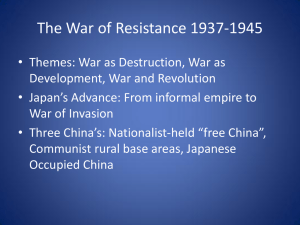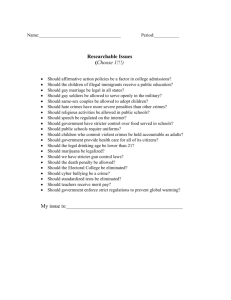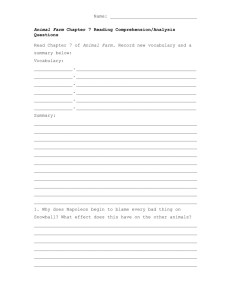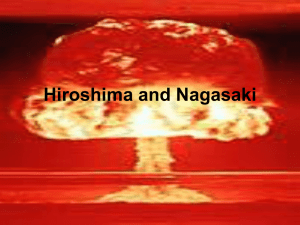HIST378-01
advertisement
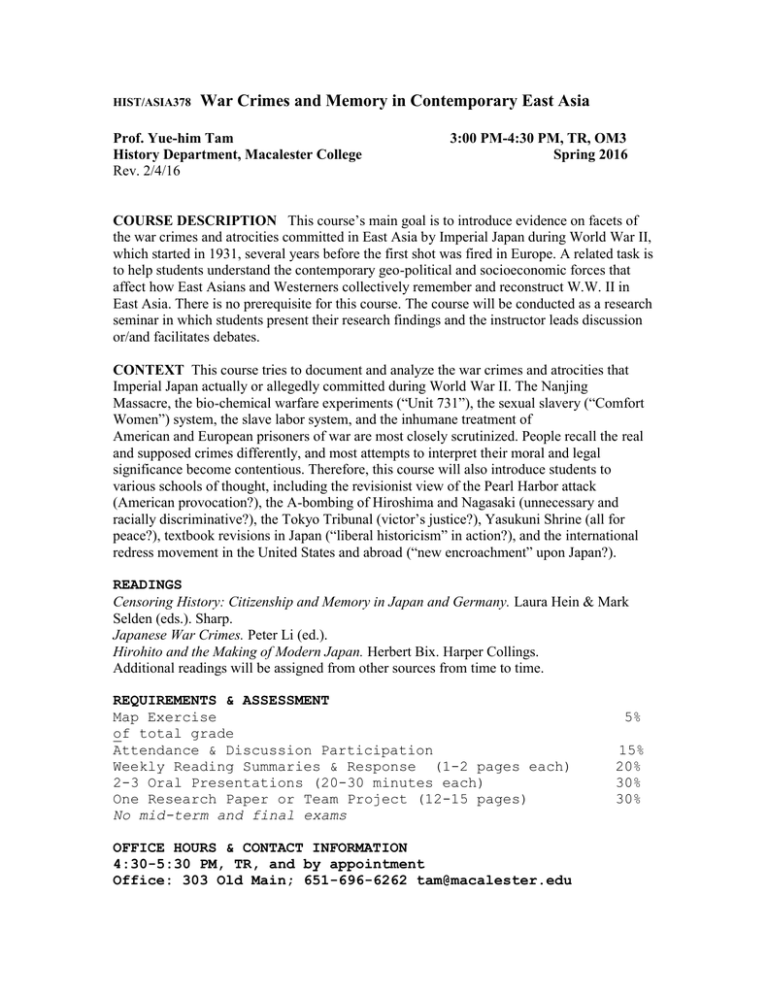
HIST/ASIA378 War Crimes and Memory in Contemporary East Asia Prof. Yue-him Tam History Department, Macalester College Rev. 2/4/16 3:00 PM-4:30 PM, TR, OM3 Spring 2016 COURSE DESCRIPTION This course’s main goal is to introduce evidence on facets of the war crimes and atrocities committed in East Asia by Imperial Japan during World War II, which started in 1931, several years before the first shot was fired in Europe. A related task is to help students understand the contemporary geo-political and socioeconomic forces that affect how East Asians and Westerners collectively remember and reconstruct W.W. II in East Asia. There is no prerequisite for this course. The course will be conducted as a research seminar in which students present their research findings and the instructor leads discussion or/and facilitates debates. CONTEXT This course tries to document and analyze the war crimes and atrocities that Imperial Japan actually or allegedly committed during World War II. The Nanjing Massacre, the bio-chemical warfare experiments (“Unit 731”), the sexual slavery (“Comfort Women”) system, the slave labor system, and the inhumane treatment of American and European prisoners of war are most closely scrutinized. People recall the real and supposed crimes differently, and most attempts to interpret their moral and legal significance become contentious. Therefore, this course will also introduce students to various schools of thought, including the revisionist view of the Pearl Harbor attack (American provocation?), the A-bombing of Hiroshima and Nagasaki (unnecessary and racially discriminative?), the Tokyo Tribunal (victor’s justice?), Yasukuni Shrine (all for peace?), textbook revisions in Japan (“liberal historicism” in action?), and the international redress movement in the United States and abroad (“new encroachment” upon Japan?). READINGS Censoring History: Citizenship and Memory in Japan and Germany. Laura Hein & Mark Selden (eds.). Sharp. Japanese War Crimes. Peter Li (ed.). Hirohito and the Making of Modern Japan. Herbert Bix. Harper Collings. Additional readings will be assigned from other sources from time to time. REQUIREMENTS & ASSESSMENT Map Exercise of total grade Attendance & Discussion Participation Weekly Reading Summaries & Response (1-2 pages each) 2-3 Oral Presentations (20-30 minutes each) One Research Paper or Team Project (12-15 pages) No mid-term and final exams OFFICE HOURS & CONTACT INFORMATION 4:30-5:30 PM, TR, and by appointment Office: 303 Old Main; 651-696-6262 tam@macalester.edu 5% 15% 20% 30% 30% Syllabus [Reading assignments will be given by the instructor and/or presenters one week in advance.] Week 1 Introduction: Universal concepts and international laws about war, war crimes, crimes against humanity, the search for justice and the associated problems regarding World War II in East Asia. Weeks 2 & 3 World War II in East Asia: Why did the "Taisho Democracy" in pre-war Japan give way to the so-called "Valley of Darkness?" Why and how did the Chinese and other Asians resist Japanese aggression? Did the “Greater East Asia Sphere of Co-prosperity” succeed? Week 4 The Nanjing Massacre: What happened during the "Rape of Nanking?" Why do most historians consider the Nanjing Massacre history, not a fabrication? Week 5 The Military Sexual Slavery (“Comfort Women”) System: What happened to the 500,000 women who were forced into military prostitution? Who ran the “Comfort Stations”? Do the victims consider the “Asian Women's Fund” atonement? Week 6 The Bio-Chemical Warfare (“Unit 731”) System: What happened to the so-called "human logs"? Who staffed the “Unit 731”? Why does the bio-chemi gas issue significant in China? Week 7 The Slave Labor System: What happened to the modern slaves? Who implemented the system? How many Japanese corporations were involved? Why did the victims and their supporters regard the Hanaoka Settlement unacceptable? Week 8 The Treatment of American and European POWs: What happened to the men who tried to surrender? How did the Japanese captors treat the American, Dutch and other European POWs? What do the survivors say and want today? Week 9 The Pearl Harbor Attack: Americans at Fault? The Tokyo Tribunal: Victor’s Justice? Fact versus theory in both cases; how have strategists, historians and jurists interpreted both events? What do the deniers say about both events? Week 10 The Atomic Bombs: Unnecessary and Racially Discriminatory? What happened on August. 6th and 9th, 1945? Why did the U.S. drop the A-bombs? Why did the Smithsonian Exhibition in 1995 become controversial? Week 11 The Yasukuni Shrine: Exhibit for Peace or House of War Criminals? What is the shrine's history? Why do people protest against -- and fear -- Japanese official visits to the shrine? Week 12 Textbook Revision: ‘Liberal Historicism” in action? Why do the history textbooks in Japan after the 1960s become controversial? Why do the problematic textbooks matter to Japan’s Asian neighbors, particularly the Koreans and the Chinese? Week 13 International Redress Movement: A New Encroachment on Japan or a Just Cause? What is the movement about? Why did the international redress movement arise in the 1990’s? Who are the leading activists? The leading scholarly and advocate organizations in the United States, Canada, the Netherlands, Japan, Korea and China. Weeks 14 & 15 What have we learnt about history, justice and humanity? Can the San Francisco Peace Treaty resolve the war issues in Asia? Reflection and discussion: understanding the war, war crimes, collective memories and search for justice and humanity with reference to our world and time today. Class Schedule & Presentation Schedule will be announced later. End
